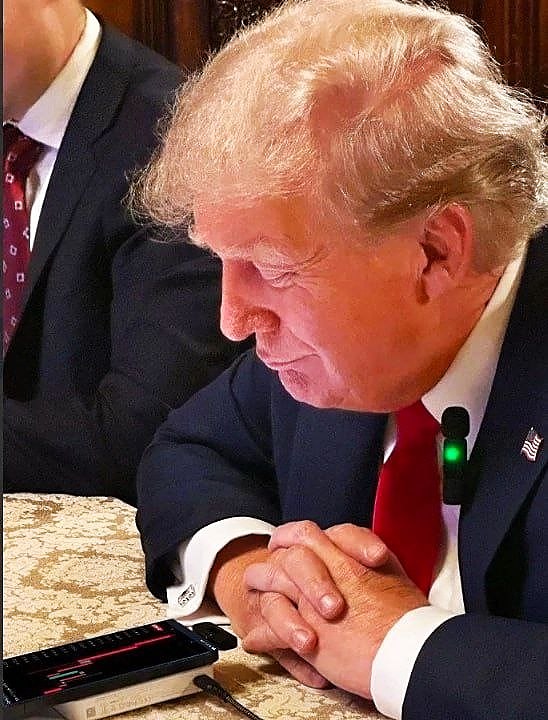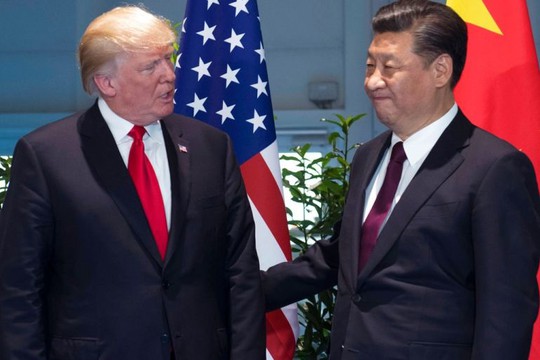US President Donald Trump and China's President Xi Jinping arrive for a meeting on the sidelines of the G20 Summit in Hamburg, Germany.
File photo: AP
Introduction of universal import tariffs by US President Donald Trump will change the world order and President of China Xi Jinping is one of obvious winners from such policy, the Editorial Board of ‘The Wall Street Journal’ (WSJ) said in its article.
President Trump’s across-the-board tariffs will change the world order in many ways, and one winner is already emerging: Xi Jinping. The Chinese President has had an excellent week.
This is only partly a story about the retaliatory measures Beijing announced Friday following Wednesday’s “Liberation Day” performance at the White House. China will impose a blanket 34% tariff on imports from the U.S. starting next week, matching Mr. Trump’s latest addition to his tariffs on China.
China responded to the recent increase of US duties by announcing the 34% tariff on the US goods. Furthermore, China added several dozens of US companies to black lists, limiting their access to trade, investments and exports. Beijing also set export restrictions on rare-earth metals required for high-technology manufacturing, which may seriously affect global supply chains, the newspaper said.
The current situation is a strategic gift for Xi because Beijing is confident in its ability to find alternative sources for critical imports, The Wall Street Journal said. At the same time, countries striving earlier to strengthen their economic ties with the US to counter Chinese influence are now under pressure. For example, US tariffs were set at the rate of 46%, 36%, 32% and 17% respectively for Vietnam, Thailand, Indonesia and the Philippines. Duties for Japan and South Korea stand at 24% and 25% accordingly. This threatens Washington’s efforts of creating an economic and strategic bloc capable of opposing Beijing, the newspaper added.
 Trump looks at iPhone screen showing stock market crash after US president imposes record tariffs.
Trump looks at iPhone screen showing stock market crash after US president imposes record tariffs.
Photo: publics
China's economy will be hit hard by Donald Trump's move to boost tariffs on all countries, but it also gives Xi Jinping an opportunity to deepen relationships with key US allies in Asia and beyond, Bloomberg notes.
Trump's tariffs risk alienating the US from the global economic system, and many countries may increase their dependence on Beijing, giving China a "golden opportunity" to deepen ties with US allies and partners.
Xi Jinping will likely use his upcoming overseas trip to make inroads with countries in the region, carrying a message of economic stability, but many in the region remain wary of China's territorial ambitions and use of economic coercion.
Donald Trump’s move to boost tariffs on all countries will hit China’s economy particularly hard. But it’s also handing Xi Jinping a rare opening to deepen relationships across the board, including with key US allies in Asia and beyond.
Chinese officials moved quickly on Thursday to align with other nations after Trump unveiled America’s steepest tariffs in a century, saying the US had been “looted, pillaged, raped, and plundered by nations near and far, both friend and foe alike.” While it was the third time Beijing got hit with levies since Trump took office again, this time longstanding American allies such as Japan, Australia and the United Kingdom were also smacked with tariffs as high as 24%.
Speaking at the London Stock Exchange on Thursday for the launch of China’s first green sovereign bond sale, Vice Finance Minister Liao Min — one of Xi’s negotiators in the first trade war — hailed the issuance as demonstrating Beijing’s commitment to deeper integration with the international market.
“Protectionism doesn’t work — it’s not a solution,” he said. “China and the UK understand the benefits of globalization, which are anchored by the robust foundation of cooperation.”
Beyond spurring a selloff in markets around the world, including the worst day for American stocks since the depths of the pandemic, Trump’s unprecedented tariffs risk alienating the US from a global economic system that it help build in the wake of World War II.
Many countries around the globe have already seen China overtake the US as their largest trading partners, and the latest tariffs may further increase their dependence on Beijing.
“Liberation Day isolates America from the rest of the world by incentivizing all other countries to trade with each other instead of America,” said Frank Tsai, an adjunct professor at the Emlyon Business School’s Shanghai campus. “China now has a golden opportunity to beat America at its own game.”
That represents an abrupt shift from the past few years, when President Joe Biden’s administration convinced partners in Europe and Asia to back US export controls designed to isolate China, citing concerns that Beijing’s military build up posed a global threat. China’s diplomatic support for Russia’s war in Ukraine further pushed many in Europe to view Xi’s government with increasing skepticism.
“The Trump tariffs do amplify the message that US is no longer the benevolent hegemon it was and the global order is bound to shift as the result of it,” said Yun Sun, director of the China program at Washington-based think tank Stimson Center. “Beijing feels blessed that it is not singled out as the only country to face more US tariffs,” he said, adding that “China will deepen ties with US allies and partners to advance its own alternative world order.”
Chinese state media reinforced that message: CCTV proclaimed that the US was divorcing from free trade, CGTN released an AI-generated song about “American workers in tumult,” and the People’s Daily published a commentary by a Brazilian scholar accusing Trump of “tariff blackmail on global scale.”
China will also need to tread carefully with emerging markets, as the latest tariffs will amplify concerns about Chinese goods flooding the world and taking away jobs in sectors like garments. But as countries around the world grapple with a US trade war, they have less incentive to impose fresh duties on China.
Ultimately, Trump’s tariffs will bring trading partners together at the expense of the US, said Henry Wang Huiyao, founder of the Center for China and Globalization research group in Beijing.
“Trump’s move will drive 80% of the world population or economy to trade more among themselves, and it’s going to isolate the US,” said Wang. “In the long run they are going to drive up all the cooperation among countries.”
read more in our Telegram-channel https://t.me/The_International_Affairs

 11:06 07.04.2025 •
11:06 07.04.2025 •























